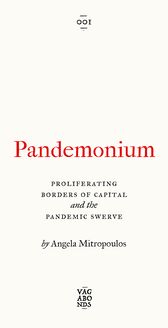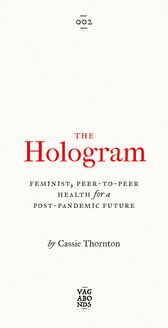-
 Univers
Univers
-
 Ebooks
Ebooks
-
 Livres audio
Livres audio
-
 Presse
Presse
-
 Podcasts
Podcasts
-
 BD
BD
-
 Documents
Documents
-
- Cours
- Révisions
- Ressources pédagogiques
- Sciences de l’éducation
- Manuels scolaires
- Langues
- Travaux de classe
- Annales de BEP
- Etudes supérieures
- Maternelle et primaire
- Fiches de lecture
- Orientation scolaire
- Méthodologie
- Corrigés de devoir
- Annales d’examens et concours
- Annales du bac
- Annales du brevet
- Rapports de stage
La lecture à portée de main
Vous pourrez modifier la taille du texte de cet ouvrage
Découvre YouScribe en t'inscrivant gratuitement
Je m'inscrisDécouvre YouScribe en t'inscrivant gratuitement
Je m'inscrisEn savoir plus
Vous pourrez modifier la taille du texte de cet ouvrage
En savoir plus

Description
In November 2019, a new strain of coronavirus appeared in Wuhan, China, and quickly spread across the world. Since then, the pandemic has exposed the brutal limits of care and health under capitalism.
Pandemonium underscores the turning-points between neoliberalism and authoritarian government, crystallised by ineffective responses to the pandemic. In so doing, it questions capitalist understandings of order and disorder, of health and disease, and the new world borders which proliferate through distinctly capitalist definitions of risk and uncertainty.
From the origins of the crisis at the crossroads of fossil-fuelled pollution and the privatisation of healthcare in China, Angela Mitropoulos follows the virus' spread as governments embraced reckless strategies of 'containment' and 'herd immunity.' Exoticist explanations of the pandemic and the recourse to quarantines and travel bans racialised the disease, while the reluctance to expand healthcare capacity displaced the risk onto private households and private wealth.
Tracing iterations of borders through the histories of population theory, the political contract and epidemiology, Mitropoulos discusses the circuits of capitalist value in pharmaceuticals, protective equipment and catastrophe bonds. These and the treatment of populations as capitalist 'stock' in demands to 'reopen the economy' reveal a world where the very definition of 'the economy' and infrastructure are fundamentally shifting. Much will depend on how these are understood, and debts are reckoned, in the months and years to come.
Acknowledgments
Introduction
1. Origin of the Species
Origins—Taxonomy—Speciation—Herding
2. Quarantine
Neoliberalism—Colonialism—Medieval Europe—Cordon Sanitaire
3. Bodies in Motion
Herd Immunity—Hobbes—Malthus—Epidemiological Mathematics—Statistics, Class, and Racial Classification
4. Pharmakon
Patriarchal Feelings—Risk-Taking, Risk-Shifting—Pushing Hydroxychloroquine—Experiments, Trials, and Lab Rats
5. Liquid Geometries of Value
Pandemic Bonds—Supply-Chain Logistics
6. Economy and Infrastructure
Money and Debt—Postpandem Contracts
Notes
Sujets
Informations
| Publié par | Pluto Press |
| Date de parution | 20 juillet 2020 |
| Nombre de lectures | 0 |
| EAN13 | 9780745343211 |
| Langue | English |
Informations légales : prix de location à la page 0,0500€. Cette information est donnée uniquement à titre indicatif conformément à la législation en vigueur.
Extrait
Pandemonium
Series editor: Max Haiven
Also available
002
The Hologram: Feminist, Peer-to-Peer Health for a Post-Pandemic Future Cassie Thornton
001
Pandemonium
Proliferating Borders of Capital and the Pandemic Swerve
Angela Mitropoulos
First published 2020 by Pluto Press
345 Archway Road, London N6 5AA
www.plutobooks.com
Copyright Angela Mitropoulos 2020
The right of Angela Mitropoulos to be identified as the author of this work has been asserted in accordance with the Copyright, Designs and Patents Act 1988.
British Library Cataloguing in Publication Data
A catalogue record for this book is available from the British Library
ISBN 978 0 7453 4330 3 Paperback
ISBN 978 0 7453 4331 0 PDF eBook
ISBN 978 0 7453 4322 8 Kindle eBook
ISBN 978 0 7453 4321 1 EPUB eBook
This book is printed on paper suitable for recycling and made from fully managed and sustained forest sources. Logging, pulping and manufacturing processes are expected to conform to the environmental standards of the country of origin.
Typeset by Stanford DTP Services, Northampton, England
Simultaneously printed in the United Kingdom and United States of America
Contents
Acknowledgments
Introduction
Origin of the Species
Origins-Taxonomy-Speciation-Herding
Quarantine
Neoliberalism-Colonialism-Medieval Europe- Cordon Sanitaire
Bodies in Motion
Herd Immunity-Hobbes-Malthus-Epidemiological Mathematics-Statistics, Class, and Racial Classification
Pharmakon
Patriarchal Feelings-Risk-Taking, Risk-Shifting-Pushing Hydroxychloroquine-Experiments, Trials, and Lab Rats
Liquid Geometries of Value
Pandemic Bonds-Supply-Chain Logistics
Economy and Infrastructure
Money and Debt-Postpandem Contracts
Notes
Acknowledgments
Many thanks go to Max Haiven and all those at VAGABONDS and Pluto Press who worked through difficult times, to Matt Kiem, S.L. Lim, Thomas Lynch, Wenny Theresia, Liz Thompson, Sanmati Verma, Liz Crash, New Inquiry , Out of the Woods, New Socialist , Transversal and, not least, the reviewers who patiently read through early versions. Caveats concerning blame for any shortcomings apply. May the churn build a new world.
Introduction
How we make sense of the pandemic is based on assumptions about the origins of the virus, the causes of disease and death with which it is associated, and contested views regarding what it exposed or revealed or is known. Understandings of disorder, like perceptions of chaos, or definitions of crisis and threat, depend a great deal on perspective and assumptions of what an orderly world might otherwise be. John Milton coined Pand monium for his epic, mid-seventeenth-century poem Paradise Lost . It means all demons -from the Greek pan for all. His use marked a shift from the meaning of daemon as ministering oracle to that of fallen angel or malign supernatural being. In Paradise Lost , Pand monium is the name of the capital city of Hell-an infernal gathering on the shore of the Lake of Fire, where disobedient angels deliberate on whether there is hope of regaining heaven or whether to believe in ancient prophecies of a new creation. Here, pandemonium instead describes the emergence of an order from treatments of chaos-and it does so without the nostalgic assumption that what went before the pandemic was a paradise undone by disobedience and sin. How and whether the pandemic presents a turning-point or swerve, and toward what, is the question to which this book is addressed.
In terms of scale, the microbial event of a new virus will arguably come to represent the largest intensive swerve of the first quarter of the twenty-first century. By the end of April 2020, New York City hospital mortuaries, crematories, and city-run morgues had run out of space. Some were resorting to refrigerated trailers. More than 17,000 people had died from the disease-almost five times more than died in the Twin Towers on September 11, 2001.
A swerve, or clinamen , was how the ancient Roman poet Lucretius described the cascading effects from one molecular movement in his epic poem On the Nature of Things -and in his deliberations on the plague that accompanied the fall of Athenian empire. There, he offers a theory of natural causes at odds with the major traditions in so-called Western philosophy which holds that it is within the nature of things to realize a destiny that was present at their origins and according to their rank. Lucretian philosophy points elsewhere. It refutes the subordination of lives to the assumptions of an idealized Way of Life and, by setting aside the sorting between unruly matter and eternal forms on which that idealization depends, the unaccountable, transcendent fatalism implicit in the terminology of the natural disaster. But if the precise, contingent base point from which a swerve happens cannot be known in advance- the molecular change in the protein spike that sets SARS-CoV-2 apart from other coronaviruses and which, among the numerous mutations for which viruses have a remarkable capacity, managed to survive repeated encounters with human immune systems-both responses to the pandemic and the conditions of human health have been centuries in the making.
Some of those responses have drawn on understandings of health and disease that are models of social order recast as an eternal nature, rendering those responses ineffective in stemming the transmission of disease. Despite drawing on the analogy of contagion to redescribe crises, much the same is true of the risk analyst Nassim Taleb s black swan, in which the question becomes how to convert an unforeseeable event and spreading crisis into an opportunity for financial gain. The black swan is simply the name for a programmable response to uncertainty that treats nonlinear effects as if they were a universal repeating pattern found in nature. These approaches redefine what an effective response to a pandemic means. Bluntly, while some responses have been turned toward saving lives, others have sought to enhance and preserve the very system that has conditioned the patterning of illness and deaths. As with the biosecurity and disaster apparatus elaborated after 9/11, definitions of threat and security, however implicit, can convene and justify actions that multiply death and suffering along certain lines.
The title of this book is also a gesture to Michel Foucault s The Order of Things -the English title of the work in which he presents his theory of how the production of knowledge is always a matter of power relations. It points, moreover, to debates and assumptions concerning neoliberalism. Against the conventional view of neoliberalism, not only did borders proliferate, but they did so largely without challenging the assumption that they are a means of protection against the ravages of capitalist exploitation rather than the arbitrage which makes exploitation possible. This facilitated the turn between neoliberal government and the resurgence of the far Right. 1
This is not to suggest that the approach taken here follows Foucault-except in foregrounding these debates and the epistemological question of how we know what we know, or think we know. 2 More so, it is to point out that The Order of Things is an allusion to the eighteenth-century political economist Adam Smith s repeated turn of phrase: the natural course and order of things. In Smith s economic liberalism, that presumably natural economic order could not be realized through sovereign rule but, instead, would be providentially manifested by the self-interest of property-owners, whose decisions would be guided by knowledge of the wealth of nations. This is the figure of homo economicus , or rational economic man. The invisible hand is revealed to economic man, in other words, by the Gross Domestic Product (GDP)-a metric that Smith envisaged but that did not quite emerge until the twentieth century. For Smith s contemporary, the reactionary cleric and political-economist Thomas Malthus, the natural economic order could only be revealed by eliminating the moral hazard of parish welfare. For him, the price of bread would be the spur to individual moral-economic decisions. The misery that ensued as the result of the withdrawal of welfare would serve as a proxy for the biblical plagues and famines by re-enacting a purportedly natural means of death for large segments of the unproductive population. Much has been made of the contrast between these crucial thinkers whose prolonged influence cannot be overstated, irrespective of whether they are still read. Yet these prototypical approaches to economic liberalism and authoritarian government are both premised on the idea of the household ( oikos ) as the primordial economic unit and presumably natural justification of exploitation. Put simply, they were both moral economists from whom the idealized (patriarchal) household served as the model of a proper law and order.
Briefly, the idea of a natural economic hierarchy is the assumption, derived from medieval estates and ancient texts on household management, of a heritable patriarchal authority over women, children and, not least, bonded servants and bound slaves. It is the source of contemporary (mis)understandings of gender and race and, in their abstraction from the history of the feudal estates and plantation economies from which capitalism emerged, their disconnection from distinct understandings of class. The false choice between liberal and reactionary forms of economic management premised on the hierarchical household ( oikos )-and its indivisible personification in a politics from which its subordinates are excluded-has become the model for almost all systems of modern political authoritarianism and economic liberalism. Because it naturalizes the asymmetries of surplus-value extraction, it is not outside the circuit of capital but integral to its systems of accumulation, particularly in moments of that circuit s crises. 3
Understanding this syst
-
 Univers
Univers
-
 Ebooks
Ebooks
-
 Livres audio
Livres audio
-
 Presse
Presse
-
 Podcasts
Podcasts
-
 BD
BD
-
 Documents
Documents
-
Jeunesse
-
Littérature
-
Ressources professionnelles
-
Santé et bien-être
-
Savoirs
-
Education
-
Loisirs et hobbies
-
Art, musique et cinéma
-
Actualité et débat de société
-
Jeunesse
-
Littérature
-
Ressources professionnelles
-
Santé et bien-être
-
Savoirs
-
Education
-
Loisirs et hobbies
-
Art, musique et cinéma
-
Actualité et débat de société
-
Actualités
-
Lifestyle
-
Presse jeunesse
-
Presse professionnelle
-
Pratique
-
Presse sportive
-
Presse internationale
-
Culture & Médias
-
Action et Aventures
-
Science-fiction et Fantasy
-
Société
-
Jeunesse
-
Littérature
-
Ressources professionnelles
-
Santé et bien-être
-
Savoirs
-
Education
-
Loisirs et hobbies
-
Art, musique et cinéma
-
Actualité et débat de société
- Cours
- Révisions
- Ressources pédagogiques
- Sciences de l’éducation
- Manuels scolaires
- Langues
- Travaux de classe
- Annales de BEP
- Etudes supérieures
- Maternelle et primaire
- Fiches de lecture
- Orientation scolaire
- Méthodologie
- Corrigés de devoir
- Annales d’examens et concours
- Annales du bac
- Annales du brevet
- Rapports de stage










